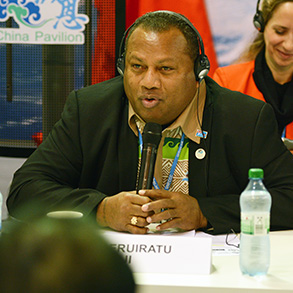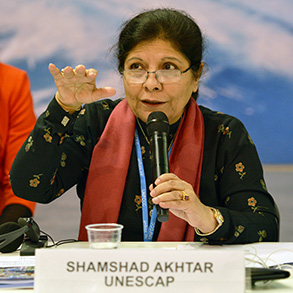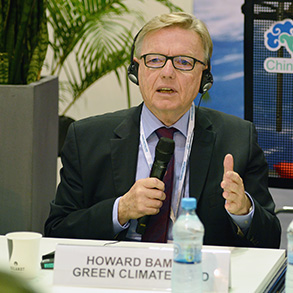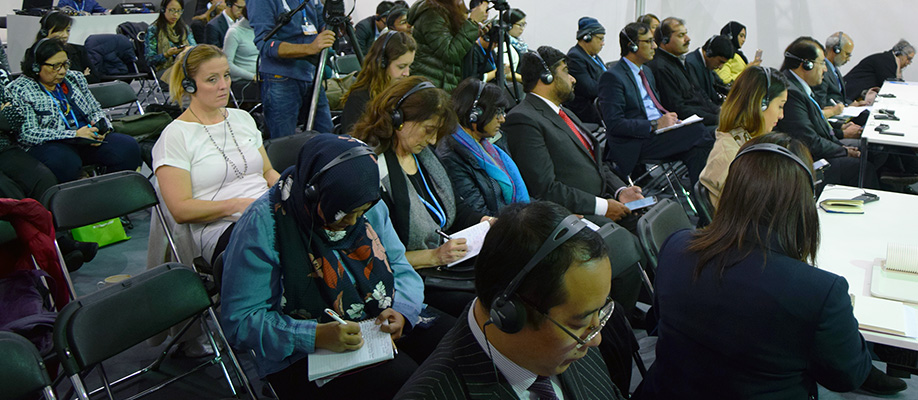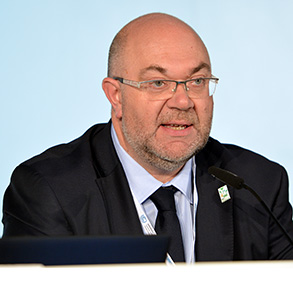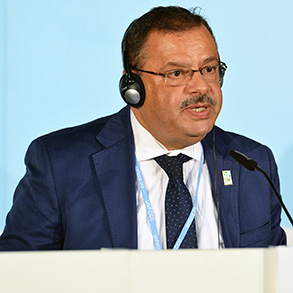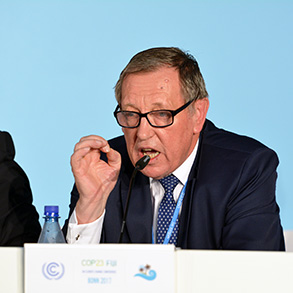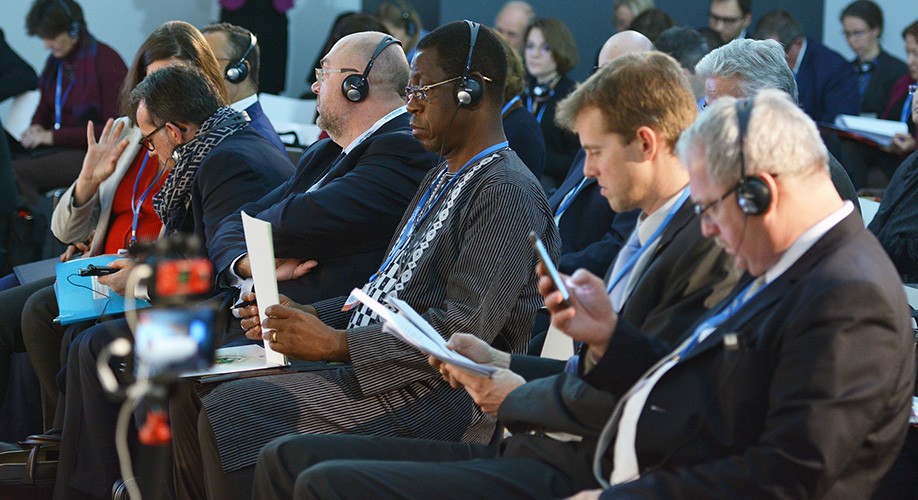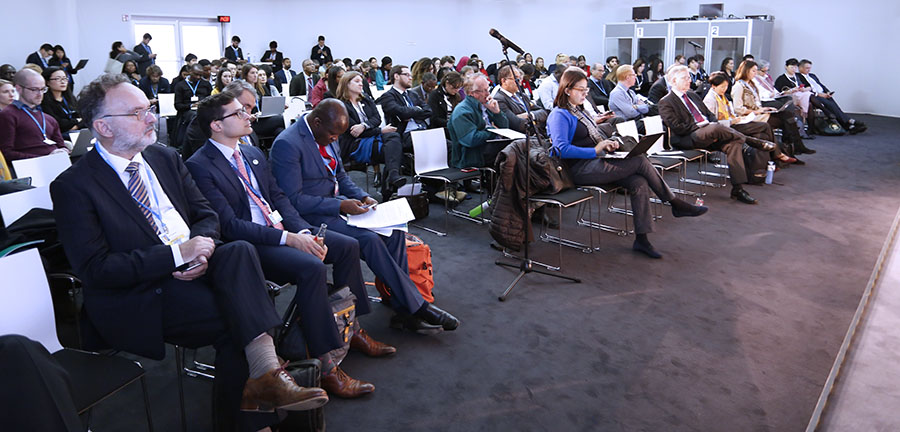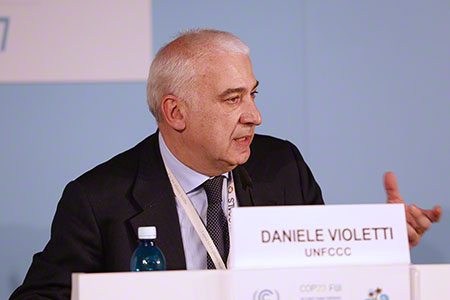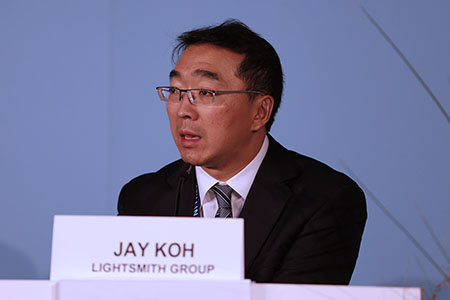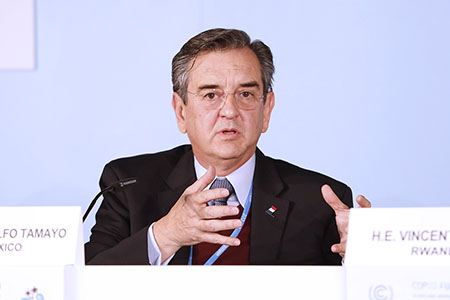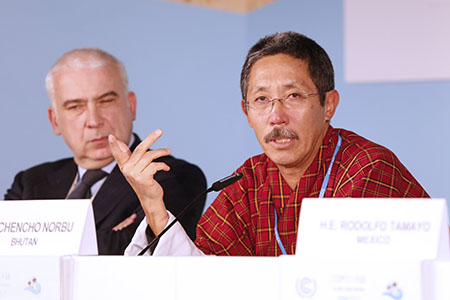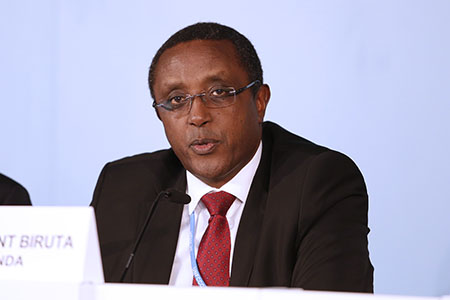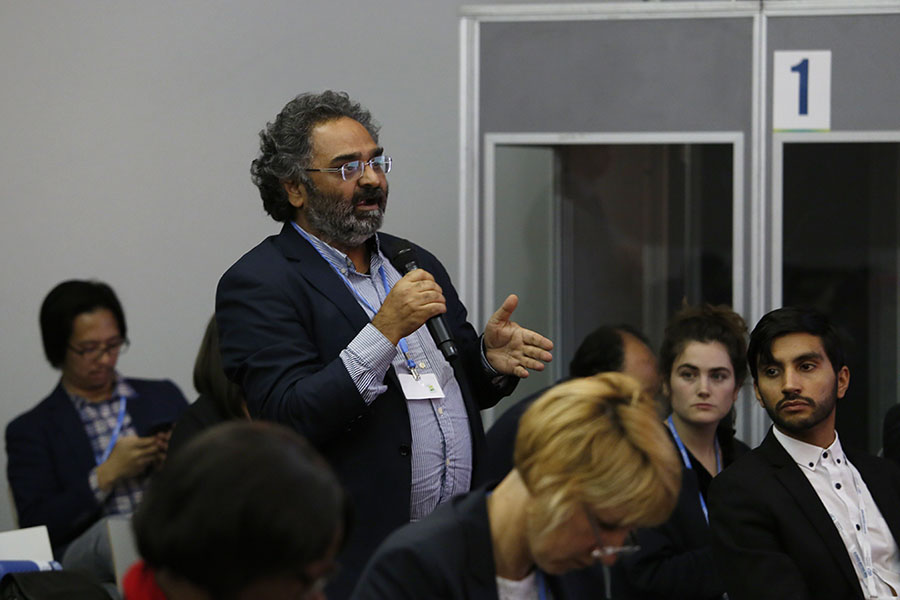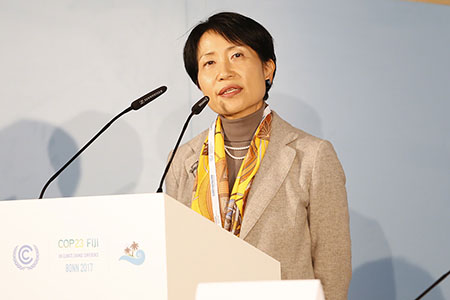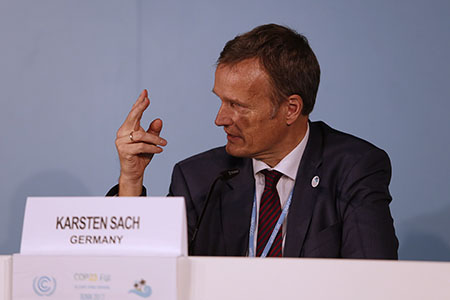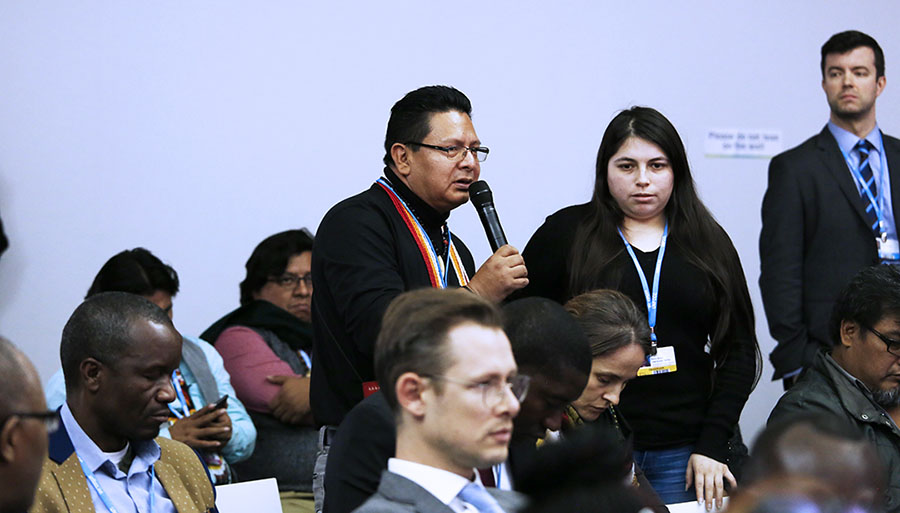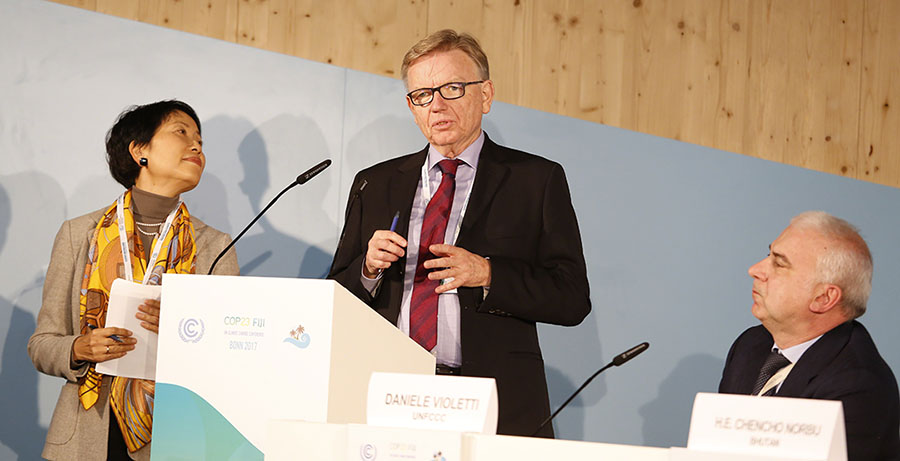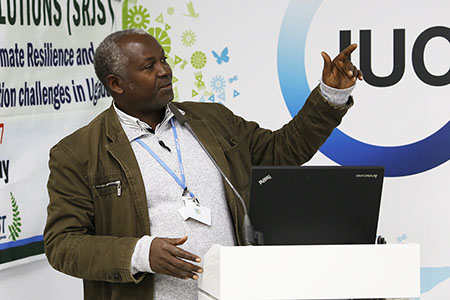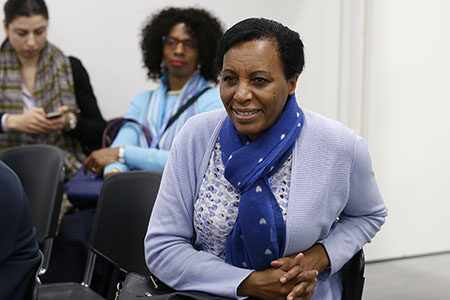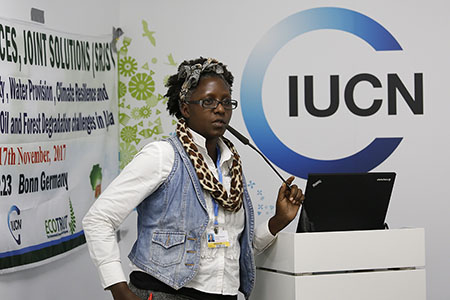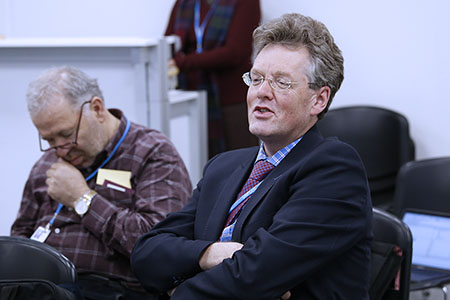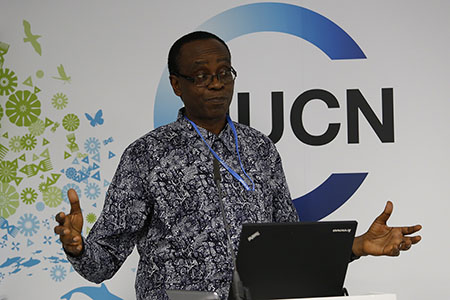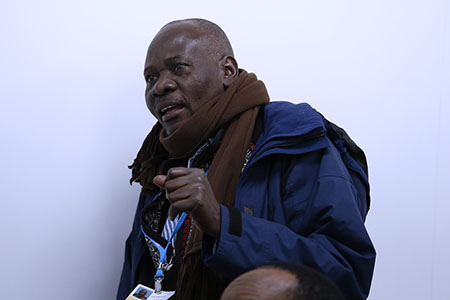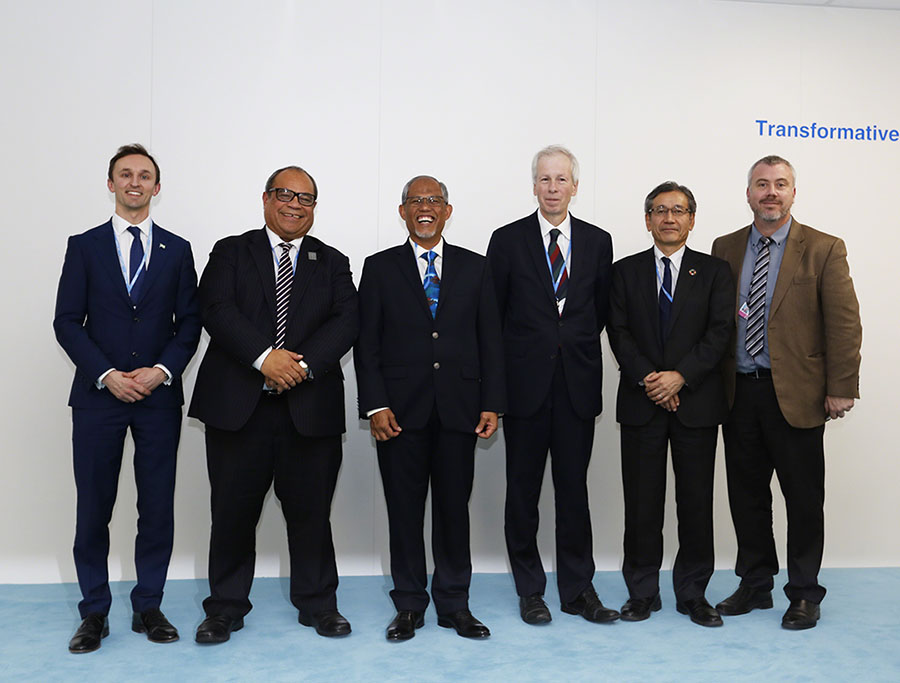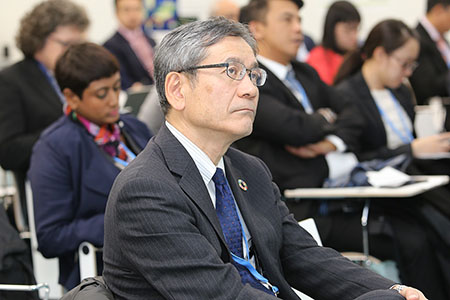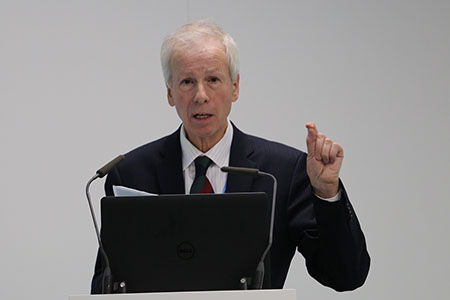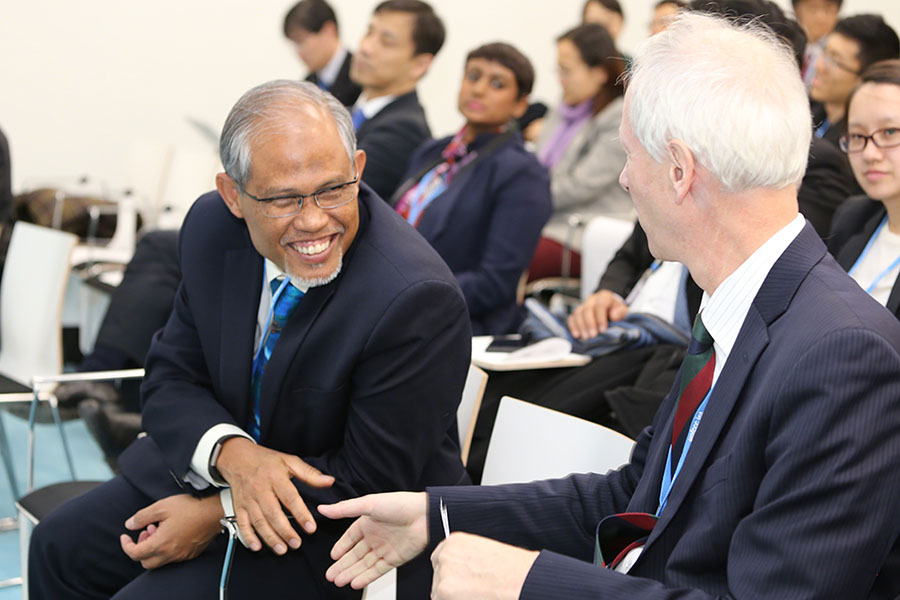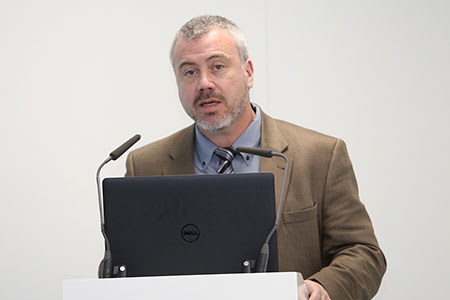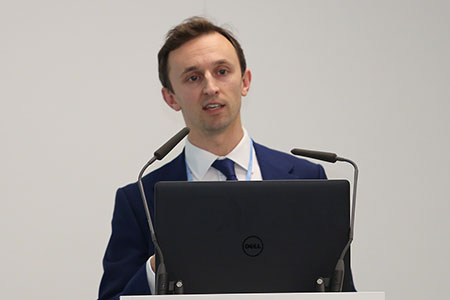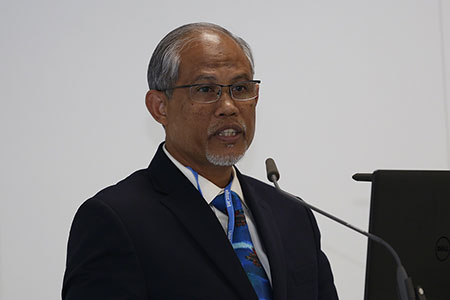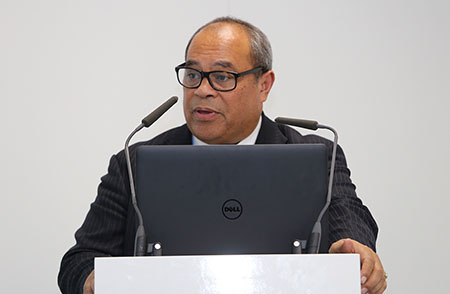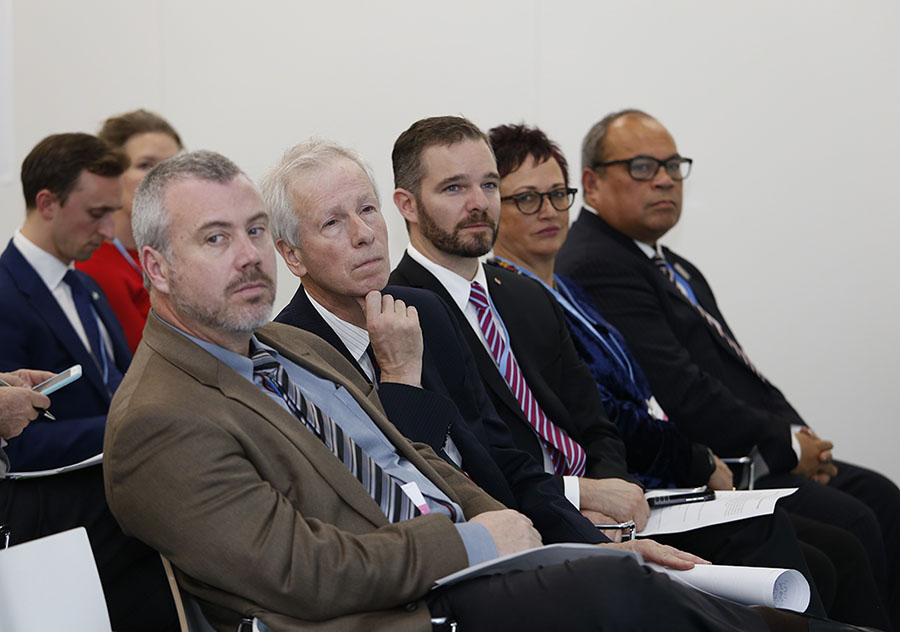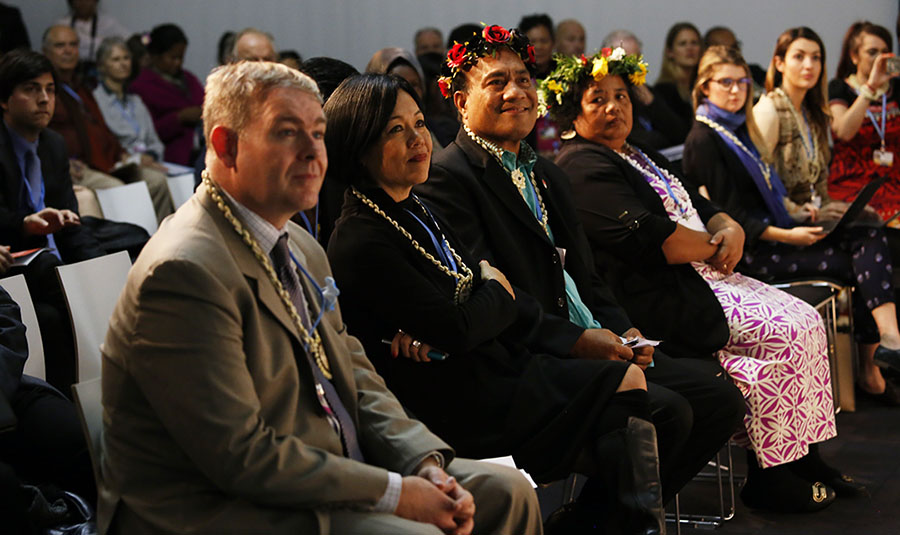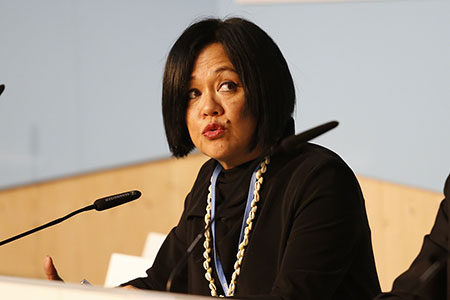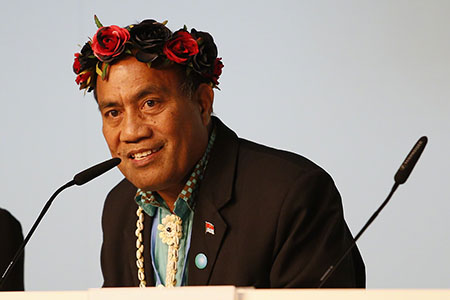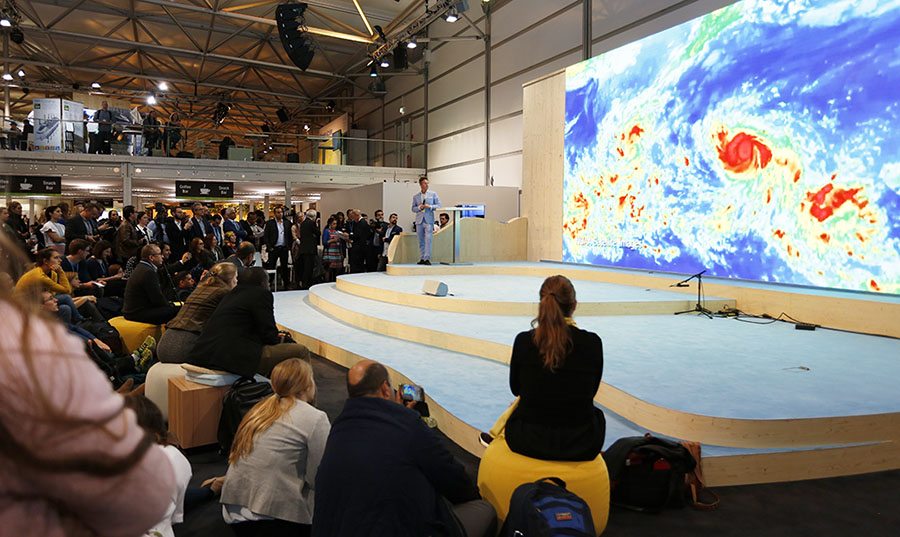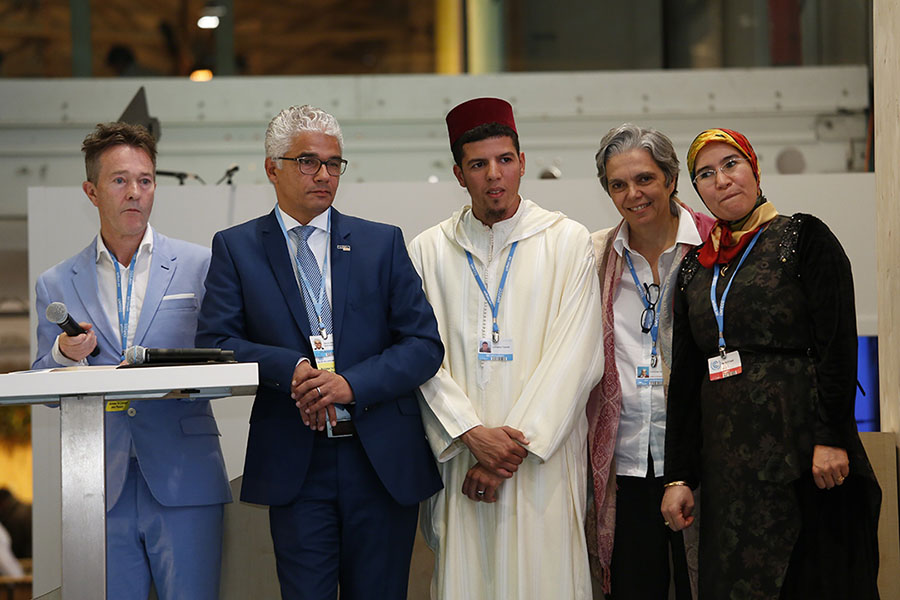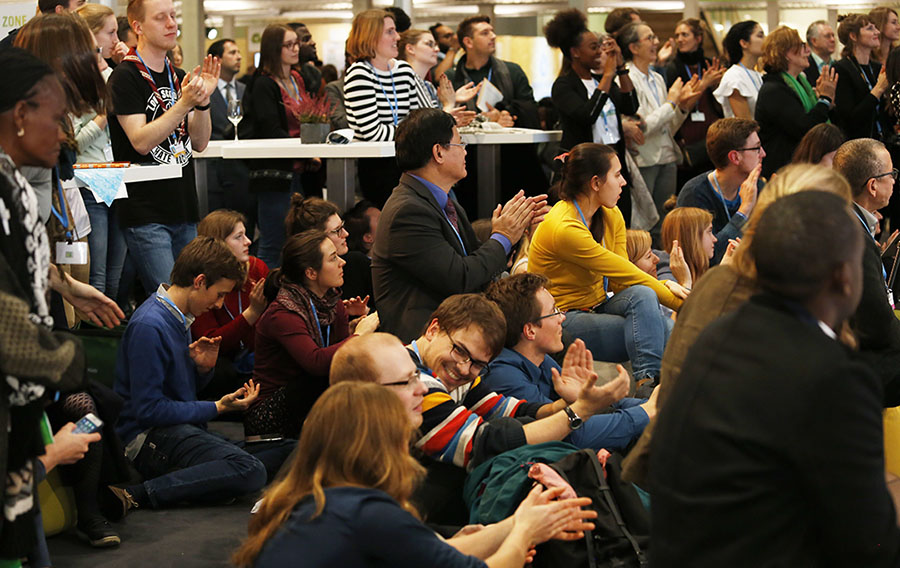Summary
The following events were covered by IISD Reporting Services on Thursday, 16 November 2017:
- Asia-Pacific Climate Action: Making Finance Flows Consistent with a Pathway Towards Low Greenhouse Gas Emissions and Climate-Resilient Development for the Implementation of the Paris Agreement and the 2030 Agenda
- How Can Agroecology Help Countries Achieve their Climate Commitments?
- Strengthening Collaboration to Support Countries in Implementing the Paris Agreement- a Joint GEF-GCF Side Event
- Oil and Gas Industry in Uganda: What it Means for Climate Resilience
- Joint Side Event by Signatory Countries to the Ministerial Declaration on Carbon Markets: Ensuring Environmental Integrity
- The integration of Climate Change, Disaster Risk Management and its Links to Sustainable Development
IISD Reporting Services, through its Earth Negotiations Bulletin on the Side (ENBOTS) Meeting Coverage, will provide daily web coverage from selected side events at the UN Climate Change Conference - November 2017.
Photos by IISD/ENB | Ángeles Estrada
For photo reprint permissions, please follow instructions at our Attribution Regulations for Meeting Photo Usage Page.
Asia-Pacific Climate Action: Making Finance Flows Consistent with a Pathway Towards Low Greenhouse Gas Emissions and Climate-Resilient Development for Implementation of the Paris Agreement and the 2030 Agenda
Presented by the UN Economic and Social Commission for Asia and the Pacific (ESCAP)
In this side event, panelists discussed climate finance in the Asia-Pacific context, including regional action to access debt capital markets. Shamshad Akhtar, ESCAP, moderated the panel. In opening remarks, she noted that climate action in the Asia-Pacific region requires significant investment, which is likely to exceed available fiscal space. Stressing that green bonds are a promising new instrument, she emphasized the need to enable developing countries to gain access to international capital markets to finance climate action. Akhtar called for: facilitating a project pipeline that can be financed through green bonds; supplementing capital markets with grant facilities; and fostering acceptance of projects from the region by the global financial community.
Inia Seruiratu, Minister for Agriculture, Rural and Maritime Development, Fiji, in a keynote speech, stressed that meeting Paris Agreement goals requires more effective and ambitious climate action by all stakeholders, and said the Marrakesh Partnership was launched for this reason. He called for non-party stakeholders to step up action, emphasizing the need: to find synergies between adaptation and mitigation; to take a cross-sectoral approach; and for finance to implement the Paris Agreement.
Howard Bamsey, Executive Director, Green Climate Fund (GCF), in a keynote address, described the GCF’s work in the Asia-Pacific as using public funds to catalyze and guide private sector investments into climate-friendly activities. He outlined challenges including: lack of supporting regulatory environments in developing countries to enable reliable returns for investors; the need for new instruments; and the need for more innovative insurance remedies. He emphasized the GCF’s country-driven nature.
Bambang Susantono, Asian Development Bank (ADB), noted that the Asia-Pacific region will require US$26 trillion in infrastructure investment from now until 2030, stressing that multilateral development banks have an important role to play in mobilizing climate finance. He emphasized the importance of, inter alia: leveraging and blending finance from a variety of public and private sources; de-risking; enhancing credit; and securitization.
Loren Legarda, the Philippines, emphasized that accessing the Adaptation Fund and the GCF remains a challenge for developing nations, including her country. She called for: simplifying and operationalizing access to finance; greening national and local-level finance communities to make commercial banks more amenable to financing renewable energy projects and less open to financing fossil fuels; and pushing green infrastructure in the Asian Infrastructure Investment Bank.
Mushahid Ullah Khan, Minister for Climate Change, Pakistan, outlined his country’s measures to combat climate change, including: national and regional laws on environmental protection; the establishment of a green development bank; and the creation of a Ministry of Climate Change. He described green banking as a paradigm shift from a business-as-usual approach, and noted the challenge of smog due to transborder emissions.
Peter Munro, International Capital Market Association, highlighted that annual green bond issuances passed the US$100 billion mark earlier in the day. Outlining his organization’s Green Bond Principles, he stressed, inter alia, that: the green bond market has experienced strong growth following the launch of these principles; the principles promote transparency, accountability and consistency in markets due to their balanced governance structure; and sovereign issuance and banks are important to spread this success.
Michael Wilkins, Standard & Poor, said the cost of implementing Nationally Determined Contributions (NDCs) will be about US$5.6 trillion, and highlighted the gap between implementation costs and what countries can afford, calling for solutions to “plug the gap.” He emphasized the potential of the green bond market to fund NDC implementation, but stressed that every type of financial instrument needs to be greened. He outlined his organization’s approach to evaluating the environmental impact of investments.
Jan-Willem van de Ven, European Bank for Reconstruction and Development (EBRD), said the bank has already reached its target of 40% green finance by 2020. He outlined de-risking initiatives, including creating a roadmap for greening Kazakhstan’s financial system, stressing that the bank can assist in providing information and financial products, and through facilitating technology transfer.
L-R: Bambang Susantono, ADB; Howard Bamsey, Executive Director, GCF; Inia Seruiratu, Minister for Agriculture, Rural and Maritime Development, Fiji; Shamshad Akhtar, ESCAP; and Mushahid Ullah Khan, Minister for Climate Change, Pakistan
Inia Seruiratu, Minister for Agriculture, Rural and Maritime Development, Fiji, said the Marrakesh Partnership will play a crucial role in implementing the Paris Agreement.
Shamshad Akhtar, ESCAP, highlighted the potential of green bonds for the Asia-Pacific region.
Howard Bamsey, Executive Director, GCF, highlighted his organization’s readiness fund to help countries create enabling environments for private sector financing.
Contact:
-
Laura Altinger (UNESCAP) | altinger@un.org
More Information:
How Can Agroecology Help Countries Achieve Their Climate Commitments?Presented by Hungary, France, the International Food Policy Research Institute (IFPRI) and the Food and Agriculture Organization of the UN (FAO)
In this side event, technical presentations and high-level panelists focused on the role and comparative advantages of agroecology in food security, building resilience, mitigating climate change impacts and facilitating countries in meeting their Paris Agreement commitments, through building on the outcomes of FAO’s Regional Agroecology Symposiums. Moderator Jessica Troni, UN Environment, introduced the event by showing video testimonies of farmers practicing agroecology worldwide.
Sándor Fazekas, Minister of Agriculture, Hungary, opening the event, recalled the outcomes of the Budapest Regional Symposium on Agroecology, and welcomed a constructive debate that will further enhance understanding of agroecological approaches to farming.
Alessandro De Pinto, Senior Research Fellow, IFPRI, presenting on the role of systems thinking in achieving the Sustainable Development Goals (SDGs) and the Paris Agreement, suggested that concepts such as agroecology, climate-smart agriculture, landscape approaches and sustainable land management practices “force us to think beyond single objectives.”
Japheth Muli, Trócaire, Kenya, reflected on the Kenyan ambition of reducing greenhouse gas emissions by 30% by 2030, and highlighting the benefits of agroecology in his country, said such practices can help achieve this goal. He noted that food systems need to involve holistic approaches that recognize the multiple public goods provided, including water, energy, soil and biodiversity.
Markus Arbenz, Executive Director, International Federation of Organic Agriculture Movements (IFOAM), elaborating on the different, yet similar agricultural approaches, including agroecology, emphasized they all need to be approached as an entire system that includes the food and value chain. He highlighted the many ways agroecology proposes to address climate change impacts, including through: mitigation via increasing tree cover and reducing reliance on wood fuel; adaptation via climate-resilient development; and improved adaptive capacity and resilience.
Participants posed questions on: the potential solution provided by reducing livestock consumption; the possibility of scaling up replicable practices; and attracting youth through agroecological farming and other revolutionary farming approaches.
During the high-level panel, Sándor Fazekas, Minister of Agriculture, Hungary, suggested agroecological farming practices as an important approach to: reduce the carbon footprint of countries; contribute to health; and improve resilience of ecosystems and biodiversity, such as through honey bee conservation. He highlighted the outcomes of the recent regional symposium which affirmed the need for healthier, circular food systems that will reduce resource use.
Stéphane Travert, Minister of Agriculture, France, highlighted that country emission reduction commitments need to simultaneously focus on food security, climate change, sustainability challenges and biodiversity protection, while addressing the expectations of all people. He urged research institutions and industry to develop innovative approaches that aim both for economic and environmental health. Citing the ambition for all French farms to adopt agroecological practices by 2025, he said this will help combat climate change by improving the sequestration ability and the nutritious productivity of soils.
Jan Szyszko, Minister of Environment, Poland, and incoming president of COP 24, emphasized the objectives of countries’ climate actions, including to: reduce emissions as much as possible through employing new technological innovations; and optimize carbon dioxide absorption through management activities, such as halting desertification and efficient water use.
Lamenting the arid climate in the Sahara region, which had been hardest hit by climate change, Samir Taïeb, Minister of Agriculture, Water Resources and Fisheries, Tunisia, described many agroecological activities introduced in his country since it adopted a national agricultural adaptation policy in 2007 to address climate change and introduce more resilient forms of agriculture. He said these smart farming practices and eco-engineering approaches have increased the country’s productivity significantly.
Batio Bassiere, Minister of Environment, Green Economy and Climate Change, Burkina Faso, noting that more than 85% of his country’s population is dependent on subsistence farming, said agroecological farming practices are “nothing new since traditional farming has always included such activities.” He highlighted efforts to support this sector, including a national strategy that builds on agroecological principles and a research center that focuses on improving understanding of the benefits of these approaches.
In closing remarks, Vladimir Olegovich Rakhmanin, Assistant Director-General, FAO, stressed the importance of obtaining personal commitments from politicians to collect and distribute the information, and understanding gained at the Regional Symposium on Agroecology.
L-R: Stéphane Travert, Minister of Agriculture, France; Samir Taïeb, Minister of Agriculture, Water Resources and Fisheries, Tunisia; Sándor Fazekas, Minister of Agriculture, Hungary; Jan Szyszko, Minister of Environment, Poland, and incoming president of COP 24; and Batio Bassiere, Minister of Environment, Green Economy and Climate Change, Burkina Faso
Stéphane Travert, Minister of Agriculture, France, lauded that multiple organic farming approaches will provide win-win solutions in the face of climate change challenges.
Samir Taïeb, Minister of Agriculture, Water Resources and Fisheries, Tunisia, said “we need to directly involve local farmers if we want comprehensive adoption of smart practices.”
Jan Szyszko, Minister of Environment, Poland, and incoming president of COP 24, emphasized that regeneration of soil is key for sustainable development globally.
High-level panelists listen to a presentation on the benefits of agroecological approaches in combating climate change.
Contact:
- Gergely Takács (Government of Hungary) | istvan.gergely.takacs@fm.gov.hu
Alessandro De Pinto (IFPRI) | a.depinto@cgiar.org
More Information:
Strengthening Collaboration to Support Countries in Implementing the Paris Agreement - a Joint GEF-GCF Side EventPresented by the Global Environment Facility (GEF) and the Green Climate Fund (GCF)
Moderated by Daniele Violetti, Chief of Staff, UN Framework Convention on Climate Change (UNFCCC) Secretariat, this event discussed synergies between the GEF and the GCF aimed at scaling up climate resilient finance.
Howard Bamsey, Executive Director, GCF, and Naoko Ishii, CEO and Chairperson, GEF, provided opening remarks. Bamsey underscored the GCF’s commitment to simplify modalities for accessing finance and to reduce transaction costs. He announced that at COP 24, all the climate funds would have an opportunity to showcase achievements. Ishii lauded the goodwill of all COP 23 participants but noted that “we are all still lagging behind,” when it comes to scaling up climate-related businesses. Citing Bhutan as an example, she said the country had demonstrated efforts aimed at putting natural capital at the forefront of development policies, and emphasized political leadership as the most essential element to inspire climate action.
Chencho Norbu, Secretary, National Environment Commission, Bhutan, stressed past efforts to revisit Bhutan’s protected areas management, noting that currently 51% of the territory is covered by protected areas. He added that the GEF could help to improve infrastructure to facilitate sustainable tourism and access for researchers.
Rodolfo Lacy Tamayo, Undersecretary of Planning and Environmental Policy, Ministry of the Environment and Natural Resources, Mexico, pointed to the “different languages” of the GCF and GEF and agreed that simplifying their mechanisms should be a priority, given the increasing number of climate finance players. He highlighted Mexico’s experience in establishing new natural sanctuaries that could become habitats for endangered species with technological support that also increases the resilience of local communities.
Vincent Biruta, Minister of Environment, Rwanda, called for: appropriate legal frameworks to promote climate finance; context-oriented policies; taking into account the diversity of nations; and enhancing private sector engagement with both funds.
Karsten Sach, Director General, Climate Policy, European and International Policy, German Federal Ministry for the Environment, Nature Conservation, Building and Nuclear Safety (BMUB), stressed the importance of the event for providing the right signal for investors. He noted challenges on promoting a paradigm shift and called for keeping in mind the whole “2030 development agenda” to ensure coherence. Sach concluded by highlighting the need to involve the private sector, national institutions and all relevant actors in the responses to climate change, and supported improving accessibility to the funds.
Jay Koh, Managing Director, Lightsmith Group, and Member of the Private Sector Advisory Sector Group of the GCF, observed that the private sector recognizes the urgency of climate change, calling for greater coordination and faster cooperation; and highlighted the growing opportunities for private entities to have a voice. He noted the challenges of “learning the language” of the multilateral processes and commended initiatives aimed at overcoming this through pilot projects that encourage innovation. He recommended that the GCF and the GEF focus on resilience and adaptation as valued themes under the Paris Agreement and encouraged innovative engagement with the private sector, which needs to understand the UNFCCC language and test new metrics to measure the scale of success of climate adaptation policies.
During closing remarks, panelists provided an outlook of the financial mechanisms in terms of supporting the implementation of the Paris Agreement and highlighted issues including: sharing lessons on project monitoring; simplifying guidelines and enhancing capacity building to improve monitoring and reporting; deviating from business-as-usual to accommodate resilience-building; and improving the flexibility of procedures to enable access to the funds’ resources.
In closing, Bamsey noted the importance of appropriate governance arrangements and improving guidelines, emphasizing support to build institutional capacity for readiness in selected countries. Ishii elaborated on building a practice for collaboration focusing on partnerships and multi-stakeholder engagement, including with indigenous peoples. She called for parties to continue supporting both the GCF and the GEF financially to enable them to contribute to a real paradigm shift.
`
L-R: Daniele Violetti, Chief of Staff, UNFCCC Secretariat; Chencho Norbu, Secretary, National Environment Commission, Bhutan, Rodolfo Lacy Tamayo, Undersecretary of Planning and Environmental Policy, Ministry of the Environment and Natural Resources, Mexico; Vincent Biruta, Minister of Environment, Rwanda; Karsten Sach, Director General, Climate Policy, European and International Policy, BMUB; and Jay Koh, Managing Director, Lightsmith Group, and Member of the Private Sector Advisory Sector Group of the GCF
Daniele Violetti, Chief of Staff, UNFCCC Secretariat, moderated the panel.
Jay Koh, Managing Director, Lightsmith Group, and Member of the Private Sector Advisory Sector Group of the GCF, said that “Paris was a moment for everybody and we are here now to work together with parties.
Rodolfo Lacy Tamayo, Undersecretary of Planning and Environmental Policy, Ministry of the Environment and Natural Resources, Mexico, defended the use of new technologies to protect natural habitats.
Chencho Norbu, Secretary, National Environment Commission, Bhutan, said much still needs to be done but we are committed to protect our natural capital.
Vincent Biruta, Minister of Environment, Rwanda, said that “we need to prioritize actions, but countries need to know where they need to go.”
Naoko Ishii, CEO and Chairperson, GEF, noting Bhutan’s accomplishments, called for countries’ commitment to natural capital.
Karsten Sach, Director General, Climate Policy, European and International policy, BMUB, called for more coherence in developing polices and scaling up the ambition of NDCs.
Howard Bamsey, Executive Director, GCF, declared “if we are talking about transformation, we need to focus on CO2 saved and not necessarily dollars spent, when evaluating projects.”
Contact:
- Camila Perez Gabilondo (GEF) | cperezgabilondo@thegef.org
More Information:
- Michel Smitall (GCF) | msmittal@gcffund.org
Oil and Gas Industry in Uganda: What it Means for Climate ResiliencePresented by the National Association of Professional Environmentalists (NAPE), ECOTRUST and the Africa Institute for Energy Governance (AFIEGO), with support from the International Union for Conservation of Nature (IUCN)
In this side event, panelists discussed the impact of the expanding oil and gas sector in Uganda on climate resilience. Pauline Nantongo Kalunda, Executive Director, ECOTRUST, moderated the session. She introduced exploration in the Albertine Rift in Uganda, which includes protected areas, Ramsar sites and endemic biodiverse areas. She noted three oil and gas companies operating in the area, and explained that the pipeline to be established from Lake Albert to the coast of Tanzania passes over critical environmental sites and will displace people.
Geoffrey Kamese, NAPE, Uganda, highlighted the important natural resources contained within the Albertine Rift, including, among others, 39% of African mammal species, 60% of Uganda’s water bodies and 70% of Uganda’s protected areas. He explained that in his country, 6.5 billion barrels of oil have already been discovered, which accounts for only 40% of the total explorable area. In outlining key impacts to humans and the environment from oil and gas exploration in Uganda, he highlighted: environmental degradation; land grabs; human rights abuses; polluted water bodies; increased displacement of people; and conflict over resources.
Nnimmo Bassey, Director, Health of Mother Earth Foundation, spoke about the experience of oil exploration in his country of Nigeria, noting that oil was first discovered there in 1956. He said that it would take 30 years to clean up water and land lost in his country to oil and gas, adding that there is an oil spill occurring somewhere on earth at every second. He reiterated Geoffrey Kamese’s statement, adding that petroleum and pipelines decrease livelihood opportunities, cause deforestation, and increase poaching, armed conflict and other illegal activities. Regarding efforts to increase solidarity amongst communities affected by oil and gas exploration, he highlighted: the FishNet Alliance, designed to protect fisheries in Cameroon, South Africa and Nigeria, with hopes to expand to Lake Albert; and the Sustainability Academy, a knowledge-sharing platform.
During the ensuing discussion, participants addressed, among others: how policies in Uganda include environmental impact assessment; good cases of resource extraction inAfrica; what is being done to address climate-induced migration; why a harmful industry should be prioritized; and what panelists hope to achieve in the oil and gas sector.
Nantongo Kalunda concluded the session, pointing to 'Shared Resources, Joint Solutions,' an IUCN-led initiative to empower civil society organizations to equip for climate resilience. She called on governments to change tactics in moving forward on oil and gas.
Geoffrey Kamese, NAPE, said that “people may not be able to cope with climate change,” due to additional stressors that oil and gas placed on them.
An audience member asked why oil is being explored, when “the future is away from oil.”
Pauline Nantongo Kalunda, Executive Director, ECOTRUST, said that in Uganda, actions to protect the environment are done “to tick boxes.”
An audience member pressed panelists to explain how they hoped Uganda would move forward in the oil and gas sector.
Nnimmo Bassey, Director, Health of Mother Earth Foundation, underscored that “oil and gas represent the opposite of resilience.”
An audience member questioned why developed countries condemn the oil and gas sector in negotiations, but encourage their developing country counterparts to develop the sector.
Contact:
-
Kureeba David (NAPE) | kureebamd@yahoo.com
More Information:
Joint Side Event by Signatory Countries to the Ministerial Declaration on Carbon Markets: Ensuring Environmental IntegrityPresented by the Government of Japan and the Government of New Zealand
This event was moderated by Kazuhisa Koakutsu, Japan, who noted the importance of operating carbon markets while ensuring environmental integrity, and invited Singapore to sign the declaration.
Yasuo Takahashi, Vice-Minister for Global Environmental Affairs, Ministry of the Environment, Japan, emphasized that his country recognized the importance of providing incentives for emission reduction activities, including in introducing carbon pricing and domestic policies. He noted the importance of promoting advanced technology to reduce GHG emissions and of project implementation, concluding that Japan “wants to support the operationalization of efficient and effective carbon markets.”
Stéphane Dion, Ambassador to Germany and Special Envoy to the European Union and Europe, Canada, underscored that his country aims to be a carbon market pioneer, noting that international carbon markets will mobilize investment and encourage private sector momentum for early action and increasing ambition. He noted Canada’s plan to charge US$100 per ton of CO2 by 2022, and concluded “it is time to put a price on the problem.”
Rodrigo Pizarro, Chile, described his country’s environmental change programme to protect its oceans and land, which has introduced significant regulation to realize its climate change commitment. He noted that the basis for the policies is the realization that markets are no longer the problem, but the solution. He emphasized that enhancing the power of the market may allow compliance with global climate mitigation objectives.
Archibald Young, Department of Business, Energy and Industrial Strategy, UK, noted that the environmental integrity of markets currently being established, is crucial. He highlighted the importance of the EU Emissions Trading Scheme, Paris Agreement Article 6 (cooperative approaches), and encouraging others to take market mechanisms forward. He underscored that since the 1990s, the UK has decarbonized by 42% while growing its economy by 67%, urging those that doubt the possibility for decoupling to take note of the UK example.
Aupito Su'a William Sio, Minister for Pacific Peoples, New Zealand, emphasized that cooperation between countries using market mechanisms is an important way to deliver climate change contributions and scale up action. He said that environmental integrity is key, and parties share responsibility in ensuring such integrity.
Masagos Zulkifli, Minister for the Environment and Water Resources, Singapore, underscored that climate change requires joint action, a strong global response and universal implementation of the Paris Agreement. Noting Singapore’s small contribution to global emissions, he stressed its commitment to coordinated action and outlined its recent Climate Action Plan and the introduction of a carbon tax in 2019 on large emitters, which will cover about 80% of total emissions.
L-R: Archibald Young, Department of Business, Energy and Industrial Strategy, UK; Aupito Su'a William Sio, Minister for Pacific Peoples, New Zealand; Masagos Zulkifli, Minister for the Environment and Water Resources, Singapore; Stéphane Dion, Ambassador to Germany and Special Envoy to the European Union and Europe, Canada; Yasuo Takahashi, Vice-Minister for Global Environmental Affairs, Ministry of the Environment, Japan; and Rodrigo Pizarro, Chile
Yasuo Takahashi, Vice-Minister for Global Environmental Affairs, Ministry of the Environment, Japan, noted that the variety of participants at the event “demonstrates that there is great interest in carbon markets.”
Stéphane Dion, Ambassador to Germany and Special Envoy to the European Union and Europe, Canada, highlighted that “Canada believes in carbon markets and this Declaration is the most effective way to get there.”
Rodrigo Pizarro, Chile, emphasized that we are at a “turning point” to enhance the power of the markets and reduce our climate footprint.
Archibald Young, Department of Business, Energy and Industrial Strategy, UK, outlined the UK’s activities on carbon markets, noting its recent Clean Growth Strategy.
Masagos Zulkifli, Minister for the Environment and Water Resources, Singapore, noted Singapore’s commitment to collaborate, exchange experiences and learn from other countries.
Aupito Su'a William Sio, Minister for Pacific Peoples, New Zealand, welcomed Singapore into the Ministerial Declaration.
Contact:
-
Kazuhisa Koaktusu (Japan) | kazuhisa_koaktusu@env.go.jp
More Information:
The Integration of Climate Change, Disaster Risk Management and its Links to Sustainable DevelopmentPresented by Kiribati and the Pacific Islands Forum Secretariat (PIFS)
Moderated by Peniita Taiaa Kabubuke Garisau, Kiribati, this side event shared Kiribati’s actions to adapt to the growing challenges of climate change. It started with a prayer, a traditional dance and a video, setting the stage for the discussion. The video highlighted Kiribati’s 20-Year Vision 2016-2036 (KV20) and development roadmap, and featured the island’s main pressures, including coastal erosion, scarcity of clean water and sea-level rise. It emphasized that Kiribati has 33 small islands across the Pacific and a population of 110,000, and stressed investments for preserving traditional culture and sustainable tourism, noting the intention to transform Kiribati into the “Dubai of the Pacific.” The video also showcased an ongoing project constructing 330 hectares of new land to accommodate the growing population, which is highly concentrated in small territories.
In a keynote speech, Taneti Maamau, President of Kiribati, highlighted the urgency of building resilience for present and future generations of his country, and called for greater international solidarity. He further detailed the KV20 vision, recalling Kiribati’s development challenges in the face of climate change, and emphasized national consultations on people’s perceptions of climate change, including their willingness to stay in the country in the face of climate threats. He noted: KV20 as a people-centered vision; innovative financing modalities including debt financing; and the use of sovereign funds to address disaster related risks. He declared “it’s all about adaptation,” noting that natural disasters are a reality in his country and that only strategic thinking and a long-term vision can ensure resilience for all in Kiribati.
Meg Taylor, Secretary General, Pacific Islands Forum Secretariat (PIFS), presented the Framework for Resilient Development in the Pacific. She explained that it is based on national efforts, underscoring the impacts of climate change and natural hazards, which cannot be addressed in isolation of development challenges. She added that the framework will avoid work duplication and ineffective resource use, unlike previous regional policy frameworks. She underscored implementation challenges and called on the region to think synergistically, act together and behave differently. She concluded by applauding the KV20 vision.
In response to questions raised from the floor, Maamau stated that, inter alia: Kiribati is considering innovative financing methods such as concessional loans at interest rates of 1-2%; it is targeting niche ecotourism markets; and challenges exist for coordinating various agencies for disaster management and climate adaptation.
I-Kiribati youth impress the audience with traditional dance.
Meg Taylor, Secretary General, PIFS, underscored “building resilience is everyone’s business.”
Taneti Maamau, President of Kiribati, called for international solidarity, as climate change is “no longer a dream” but a very tangible threat for all small island states.
Contact:
-
Tearinibeia Enoo (President’s office, Kiribati) | tteabo@ob.gov.ki
More Information:
Award Ceremony of the Global Youth Video Competition on Climate Change 2017


